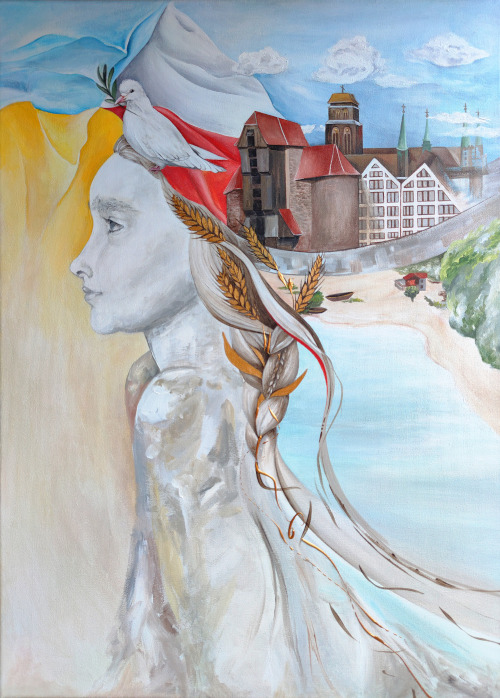Day 9 : Friday 3 March
Hear our voice, O Lord, according to your faithful love.
| Ezekiel 18.21-28 | Psalm 130 | Matthew 5.20-26 |

By Alona Chernenko, Ukrainian artist in exile in Poland.
. . . . . . . . . . . . . .
Valentyn Vasylyovych Silvestrov / Валенти́н Васи́льович Сильве́стров (Ukraine 1937– ). Two songs from Maidan 2014. Kyiv Chamber Choir.
Cycle I – III
“Give Rest, O Christ, to Thy Servant”.
Cycle IV – III
Elegy
. . . . . . . . . . . . . .
from: Eternal echoes, by John O'Donohue. Perennial, 1999. pp. 133–35.
If You Cannot Forgive, You Are Still in Jail
In an article. in the New York Times shortly before he died, Joseph Brodsky wrote about prison literature: In prison you have limited space and unlimited time. This is the exact context in which your mind could unravel. You can do terrible things to your mind. It is so lonely that you cannot be protected from yourself. It would bring relief to give your tor-menting self a holiday away from your life so that you could find peace. At such times, you are a prisoner of your worst self. Prisoners have to be very careful about minding their inner world. One should pray for those in prison that though they have lost the outside world, the mystery of the inner world might open for them.
When you have unlimited time with yourself, the danger is that you would tear yourself apart. Nietzsche said, “In a time of peace the warlike person attacks himself.” This happens also of course to communities; they go to war with themselves in the absence of enemies. This danger is, however, a permanent companionship of some lives. There are people this morning whose lives were never better. There is peace around them. Objectively, their conditions are very good, yet they are totally tormented. They have scraped away the last vestiges of shelter from their souls. There is nothing significantly wrong here. It is just that these demented people have designated their minds to become their tormentors. Their hostility is now focused on everything about themselves. They have become prisoner and torturer in one.
Forgiveness is one of the really difficult things in life. The logic of receiving hurt seems to run in the direction of never forgetting either the hurt or the hurter. When you forgive, some deeper, divine generosity takes you over. When you can forgive, then you are free. When you cannot forgive, you are a prisoner of the hurt done to. you. If you are really dis¬appointed in someone and you become embittered, you become incarcerated inside that feeling. Only the grace of forgiveness can break the straight logic of hurt and embitter¬ment. It gives you a way out, because it places the conflict on a completely different level. In a strange way, it keeps the whole conflict human. You begin to see and understand the conditions, circumstances, or weakness that made the other person act as she did.
I remember once, during the former Communist dictatorship in Czechoslovakia, reading an interview with a leading Czech dissident. The authorities often arrested and jailed him. He was asked in the interview how he kept his poise. He said he never allowed himself to forget during interrogation that his interrogators were human like himself. He said that were he to caricature them as monsters he would have lost his freedom and shelter in the situation. To keep it human helped him stay human, too.
A friend from the former East Germany spent a lot of time in jail there. The Communist regime saw him as a subversive who kept raising awkward questions about the sys¬tem. He says that one of the first things he h.ad to learn in jail was not to resent the prison guards. If he had, he could not have endured the jail. He was friendly with them, insofar as that was possible, and never allowed his mind to focus destructively on them. Walking this emotional tightrope, he managed to keep his balance and freedom during his years of imprisonment. Years afterwards, when he was out of jail, he happened to meet one of his former fellow prisoners. They talked of their years in jail. This man began to tell him of the hatred he still harboured for the prison guards, and told my friend what he would do to them if he ever met any of them. My friend said to him, “The sad thing about what you are saying is that it shows that you are still in prison.” If you cannot forgive you are still in jail. When you forgive those who have wronged you, you free yourself from prison. You take from your own heart the hook that has dragged you along behind those people across fields of years.
Why are we so reluctant to leave our inner prisons? There is the security of the confinement, and limitation that we know. We are often willing to endure the searing sense of forsakenness and distance which limitation brings rather than risking the step out into the field of the unknown. It used to be common that longtime prisoners when released often gravitated, back towards the jail; the daylight hurt their eyes, and it was so long since they had had to live in the outside world. This reluctance is captured powerfully in Par Lagerkvist’s novel Barabbas, in which he imagines Barabbas being released from jail. His future life is poignantly haunted by the shadow of the young man who was crucified in place of him. “Windows,” a poem by the Greek poet Constantine Cavafy, describes living inside hungry days in confinement: “I wander round and round / trying to find the windows. . .” Without the grace and encouragement of the eternal, we would be forever confined.
May God our Redeemer show us compassion and love. Amen.